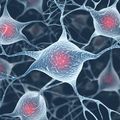Text to go here...
 Why does Huntington's disease lead to the death of brain cells, whilst causing negligible damage to cells elsewhere in the body? The culprit could be a protein recently characterised in mouse studies.
Why does Huntington's disease lead to the death of brain cells, whilst causing negligible damage to cells elsewhere in the body? The culprit could be a protein recently characterised in mouse studies.
Huntington's disease is caused by a mutated gene that produces a faulty version of a protein called Huntingtin. This mutated protein is found throughout the body; so why does it only cause damage to brain cells? In particular why is cell death mainly confined to the corpus striatum, the area of the brain responsible for movement?
To answer these questions scientists looked for proteins within the corpus striatum that interacted with the mutated Huntingtin protein (mHtt). They found a protein called Rhes which bound much more strongly to the mutated form than the healthy one. The team then administered combinations of mHtt, healthy Htt and Rhes to brain cells taken from mice. Half the cells died within 48 hours when mHtt and Rhes were present together.
They found that Rhes had an impact on clumping of the mutant Huntingtin. In all of the cells in the body containing the mHtt, the cells were protected by clumping of the mutant protein. But in the presence of Rhes, the protein clumps broke down. It is thought that this dispersion of mHtt is responsible for damage to brain cells.
The team is now looking at whether removing Rhes from mice with Huntington's disease can stop the brain cells from dying, or at least slow down the deterioration.
See the AnimalResearch.info pages for more information on Huntington's disease.
Last edited: 11 January 2022 08:44




